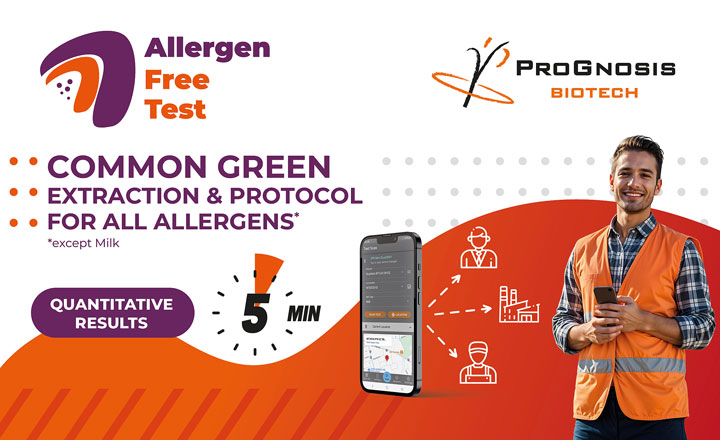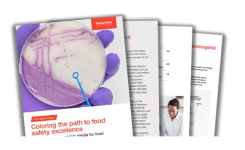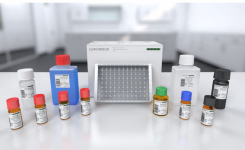The MonoTrace® Soy kit is a rapid food allergen ELISA kit that is highly specific and selective towards soy protein on food contact surfaces, rinse waters and foodstuffs. To counteract the risk of matrix effects in a food product, it is critical to apply robust food allergen detection like the MonoTrace kit that can target the soy legume with high specificity and limit cross reactivity to other ingredients, especially other legumes.
BioFront Technologies offers a comprehensive food allergen ELISA testing platform that includes rapid MonoTrace® test kits for Peanut, Gluten, Milk, Egg, Soy, Almond, Brazil nut, Cashew, Coconut, Hazelnut, Macadamia nut, Pecan, Pine nut, Pistachio, Walnut, Buckwheat, Lupin, Sesame Seed, Mustard, Fish and Crustacea. Unique to BioFront, all MonoTrace kits employ monoclonal antibody detection. Through careful selection of the food allergenic marker and testing, BioFront chooses the very best characteristics that can be cultured to provide a continuously renewable source of distinctive monoclonals employed in all MonoTrace test kits.
The MonoTrace Soy ELISA kit from BioFront Technologies was evaluated using soy flour to determine various assay parameters including sensitivity, precision, robustness, and stability. The recovery of soy from ten common food matrices (including bakery mixes, margarine, cereal flours, chocolate, nut spread), was evaluated using available reference materials and mean recoveries ranging from 109% to 122% was determined. Recoveries were acceptable, per current AOAC guidelines (J. AOAC Int. 2012), for all matrices tested.
MonoTrace Soy Kit Specifications:
- Limit of Quantitation: 1 ppm
- Range of Quantitation: 1 – 40 ppm
- Assay Incubation: 30 minutes
- Antibody: Monoclonal
- Uniform Extraction Buffer: Yes, same for 16 food allergen kits
- Ready to use Standards: Yes
Proficiency test materials (PTM) sourced from FAPAS accurately and precisely determined the presence of Soy (Table 1).
Cross reactivity was examined using tree nuts, cereals, seeds, flours, meats and spices, and no matrix effects are observed, even for most legumes (Table 2). Little or low cross reactivity was observed for the 20 or more legumes tested.
Assay performance was further validated using a variety of parameters in order to show the precision (repeatability & reproducibility) and robustness of the kit. The recovery from soy-spiked samples was acceptable throughout the defined shelf-life of the kit, indicating the stability of the standards. Varying the time (± 2 mins) and temperature (± 50C) of assay incubation steps had minimal effect on accurately quantifying spiked samples, demonstrating the robustness of the assay.
 The MonoTrace Soy ELISA exhibits strong reactivity to soy with minimal cross-reactivity to other legumes. Of the many legumes tested, only garbanzo bean (0.0007%), garfava flour (0.0005%), lentil flour (0.002%), sprouted, yellow split pea (0.0004%) and peanut (0.0017%) showed low levels of cross-reactivity. Certain green pea products (sprouted green pea flour and green pea protein powder) were slightly cross-reactive in the assay (0.0005% & 0.0003%, respectively) while other green pea flours or foods containing green pea were not quantifiable. No cross-reactivity was observed in the other matrices (including tree nuts, seeds, flour, meats and spices) tested using the kit. Assay performance was further validated using a variety of parameters in order show the precision (repeatability & reproducibility) and robustness of the MonoTrace Soy kit.
The MonoTrace Soy ELISA exhibits strong reactivity to soy with minimal cross-reactivity to other legumes. Of the many legumes tested, only garbanzo bean (0.0007%), garfava flour (0.0005%), lentil flour (0.002%), sprouted, yellow split pea (0.0004%) and peanut (0.0017%) showed low levels of cross-reactivity. Certain green pea products (sprouted green pea flour and green pea protein powder) were slightly cross-reactive in the assay (0.0005% & 0.0003%, respectively) while other green pea flours or foods containing green pea were not quantifiable. No cross-reactivity was observed in the other matrices (including tree nuts, seeds, flour, meats and spices) tested using the kit. Assay performance was further validated using a variety of parameters in order show the precision (repeatability & reproducibility) and robustness of the MonoTrace Soy kit.
To receive the complete MonoTrace Soy validation report, please contact BioFront Technologies.
BioFront Technologies is ready to assist with optimizing detection of soy, be it presence/ absence or quantitation. Please contact BioFront technical support (support@biofronttech.com) for assistance to determine whether your matrix-of-interest has been validated (cross reactivity & recovery). An internal validation using a soy-spiked sample is recommended to ensure that soy protein is efficiently recovered before qualitative or quantitative results are obtained from the kit.

























